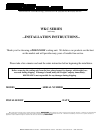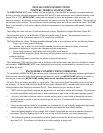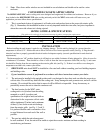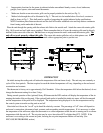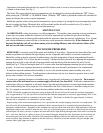WKC05/02 PG. 5
Adjustment of mechanical thermostat only requires 1/8 clockwise turn of screw to lower enclosure temperature. Screw
is located on front of unit. (See Fig. 1)
The Sentry III set point (desired enclosure temperature) may be changed by pressing and holding the "SET" button
while pressing the "COOLER" or "WARMER" button. When the "SET" button is pressed the readout will automatically
change and display the current set point temperature
Should the operation of the cooling unit be interrupted by a power outage or by raising the set point temperature while
the unit is running the Sentry III internal delay will be activated and the unit will not restart for two (2) to three (3)
minutes. NOTE: This delay may also occur on initial power-up.
MAINTENANCE
The BREEZAIRE cooling unit requires very little maintenance. To keep the system operating at its top performance,
at least once every three months the condenser coil should be inspected and vacuumed to prevent air blockage.
Remove the large warm air exhaust grille located outside the enclosure where the warm air is discharged. Use a vacuum
with a brush attachment to remove the lint or dirt that may reside between the aluminum fins. If the condenser coil
becomes blocked the unit will over heat causing a loss in cooling efficiency and will result in a failure of the
unit not covered under warranty.
ENCLOSURE PROBLEMS
BREEZAIRE is extremely proud of the quality and reliability of its products. Experience has shown that of the small
number of problems encountered, the large majority are due to improper unit selection or enclosure construction.
Should the cooling system be suspected of malfunctioning, check the temperature of the air being exhausted from the
warm air exterior grille. If it is warm, the unit is working. A further check may be made by comparing the temperature
entering the front grille on the cold side (Evaporator Intake) with that leaving from the bottom left side (Cold Air
Outlet)(see Fig.1). If the air leaving the unit is 6°F or more colder than the temperature entering, the unit is working
properly. In some cases, improper placement or installation may cause the unit's performance to be compromised.
In situations where the ambient relative humidity is very low, the desired enclosure relative humidity may not be
achieved without adding moisture. To add moisture to the enclosure only use slow, natural evaporation from a small
porous water container. Do not use a humidifier.
In some cases, improper placement or installation may cause the unit's performance to be degraded. The warm air
exterior side of the unit must have a constant supply of fresh air, less than 85
o
F. If the unit is exhausted into a
confined area with poor ventilation, it will not be able to reject the heat and moisture it is removing from the enclosure
and a malfunctioning unit will be suspected. If an obstruction to the flow of fresh air into or from the cooling unit (see
Fig. 3) is stopped or restricted for any reason the unit could heat rather than cool the enclosure.
NOTE: Should this condition develop when using the Sentry III, the unit will turn off when the enclosure temperature
rises to approximately 75°F, the unit will not restart until the enclosure temperature is lowered to approximately 65°F or the
unit is disconnected and then re-connected to the power supply. This feature is disabled for approximately 45 minutes
after the unit is connected or re-connected to a power supply.
Proper sealing of the enclosure through the use of a vapor barrier and weather stripping cannot be over emphasized. The
unit will not be able to maintain the proper conditions if fresh, moisture-laden air is constantly being introduced into an
improperly sealed enclosure. Symptoms of this condition are; unit runs all the time with only a slight reduction in enclosure
temperature and/or water overflows from the unit. One way of discovering gross air leaks is to stand inside the enclosure
with the lights off, allow your eyes to adapt to the dark and look for light showing through cracks in the walls or around the
door. Also close the door on a piece of paper, if you can pull the paper through the door, that means air and moisture are
also entering into your wine cellar. Because of the temperature difference between the inside and outside, very small
cracks can allow large amounts of outside air into the enclosure. Please be aware that moisture will pass through solid
concrete, brick, paint, paper and wood.



